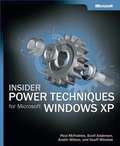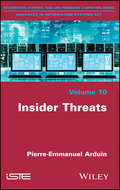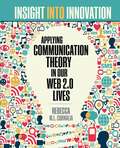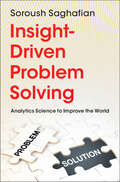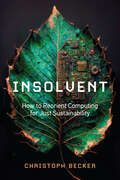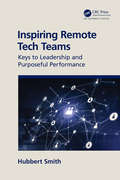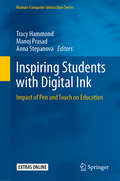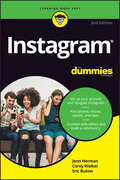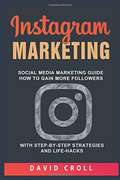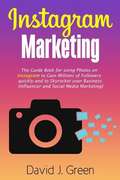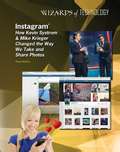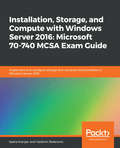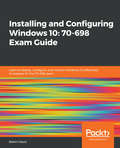- Table View
- List View
Insider Power Techniques for Microsoft® Windows® XP
by Paul Mcfedries Geoff Winslow Scott Andersen Austin WilsonAccept no limits! Tweak Windows XP for ultimate performance with the undocumented secrets and hidden gems of the experts who work with the technology every day. Three Microsoft Consulting Services (MCS) professionals have teamed with well-known Windows book author Paul McFedries to reveal their best from-the-field techniques, practices, hacks, tricks, and workarounds for putting all of your PC's muscle to work. Smart, straightforward, and uncompromisingly practical, this book is the ultimate insider's guide to pushing Windows XP as far as it can go! Put professional-level practices to work for you: Tweak registry settings without getting burned Employ lethal techniques to help fight viruses, intruders, and spam Customize startup and shutdown--get work done behind the scenes Install devices and drivers--painlessly Learn 10 ways to help give your system rock-solid stability Write your own scripts--or run the ones inside Share your PC using group policies, account lock-outs, and other management tools Optimize memory, performance, and usability Easily synchronize files between your mobile and desktop PCs Troubleshoot problems the way the experts do
Insider Power Techniques for Microsoft® Windows® XP
by Paul Mcfedries<div xmlns="http://www.w3.org/1999/xhtml"><p>Tweak Windows\xae XP for ultimate performance with the undocumented secrets and hidden gems of the experts who work with the technology every day. Use their best techniques, practices, hacks, tricks, and workarounds to put all of your PC\u2019s muscle to work.</p></div>
Insider Threats: Insider Threats
by Pierre-Emmanuel ArduinAn information system may be regarded as an organized set of resources, both technological and human. Security should take this specificity into consideration in order to ensure an overall security of information systems. The security of information systems is usually tackled in a technological perspective. This book proposes to focus not only on information systems' security in a technological perspective, but also in a human, managerial and organizational perspective.
Insight Into Innovation: Applying Communication Theory In Our Web 2. 0 Lives
by Rebecca Curnalia"Insight into Innovation : Communication Theory for our Web 2.0 Lives is a review of communication theories and research methods applied to Web 2.0 technologies that allow for user interaction, control, and user-generated content. The text covers the history of communication, areas of study, research perspectives, and essential communication theories, including each theory's core assumptions and concepts, research methods, and application to the uses and effects of Web 2.0 technologies."-
Insight-Driven Problem Solving: Analytics Science to Improve the World
by Soroush SaghafianImproving public policies, creating the next generation of AI systems, reducing crime, making hospitals more efficient, addressing climate change, controlling pandemics, and reducing disruption in supply chains are all problems where big picture ideas from analytics science have had large-scale impact. What are those ideas? Who came up with them? Will insights from analytics science help solve even more daunting societal challenges? This book takes readers on an engaging tour of the evolution of analytics science and how it brought together ideas and tools from many different fields – AI, machine learning, data science, OR, optimization, statistics, economics, and more – to make the world a better place. Using these ideas and tools, big picture insights emerge from simplified settings that get at the essence of a problem, leading to superior approaches to complex societal issues. A fascinating read for anyone interested in how problems can be solved by leveraging analytics.
Insolvent: How to Reorient Computing for Just Sustainability
by Christoph BeckerHow we can enact meaningful change in computing to meet the urgent need for sustainability and justice.The deep entanglement of information technology with our societies has raised hope for a transition to more sustainable and just communities—those that phase out fossil fuels, distribute public goods fairly, allow free access to information, and waste less. In principle, computing should be able to help. But in practice, we live in a world in which opaque algorithms steer us toward misinformation and unsustainable consumerism. Insolvent shows why computing&’s dominant frame of thinking is conceptually insufficient to address our current challenges, and why computing continues to incur societal debts it cannot pay back. Christoph Becker shows how we can reorient design perspectives in computer science to better align with the values of sustainability and justice.Becker positions the role of information technology and computing in environmental sustainability, social justice, and the intersection of the two, and explains why designing IT for just sustainability is both technically and ethically challenging . Becker goes on to argue that computing could be aided by critical friends—disciplines that draw on critical social theory, feminist thought, and systems thinking—to make better sense of its role in society. Finally, Becker demonstrates that it is possible to fuse critical perspectives with work in computer science, showing new and fruitful directions for computing professionals and researchers to pursue.
Inspiration in Photography: Training your mind to make great art
by Brooke ShadenInspiration is not a far-flung concept, out of reach to all but a few great artists and nor is it a matter of chance; as a photographer it's possible to train your mind to see the creative possibilities in any situation. Featuring the pioneering work of author Brooke Shaden and a selection of carefully chosen contributing photographers, this book provides the perfect balance of insight and instruction to help you find inspiration whenever you need it and capitalise on it every time.
Inspiring Remote Tech Teams: Keys to Leadership and Purposeful Performance
by Hubbert SmithFor me and other tech people, leaders, and members of remote teams, we will be awakened by all the fantastic hands-on hints, best practices, and guiding principles based on solid ground that Hubbert provides in Inspiring Remote Tech Teams. We will be better prepared and better equipped to both contribute and lead efficiently in the digital economies that shape the future of our world. — Thomas DiGiacomo, President of Engineering and Innovation at SUSE Inspiring Remote Tech Teams is a trail map to building effective teams and organizations—now, as world health dictates remote work, and in the future, as global talent pools contribute to our digital economy. Humans are wired to be social, and world events require social distancing from our office community. The absence of "community" triggers primitive brain responses. These instinctual responses of survival, social belonging, and the power of story all profoundly surface during our reaction as we adjust to remote work. This trail map for team leaders improves team execution despite physical separation. The book covers simple neuroscience as it applies to our "separation." It is a hands-on guide to maintaining and improving teamwork while working remotely. It is also a hands-on guide at the intersection of teams + remote + laymen’s neuroscience to create a positive sense of enthusiasm, engagement, and contribution, even when working apart. Remote teams, now and for the future, are the pathway to using global talent effectively. This book examines the combination of the "hard skills" of tech team project management and the "soft skills" of healthy distributed teams: remote offices, sales offices, partners, suppliers, customers, and teams engaging global talent pools. Practical examples and best practices offer hands-on methods to use neuroscience to help teams be their best, to improve collaboration, and to deliver consistent team results.
Inspiring Students with Digital Ink: Impact of Pen and Touch on Education (Human–Computer Interaction Series)
by Tracy Hammond Manoj Prasad Anna StepanovaThis book highlights the latest research in pen and touch, its current use in STEM classrooms, sketching and haptics technologies. Computer and educational scientists from academia and industry presented their research at the Conference on Pen and Touch Technology on Education (CPTTE) 2017 on the advancement of digital ink technology and its applications for college and K-12 classrooms. This book is the synthesis of the presented results and the ideas generated from conference discussions. This volume contains seven parts; exploring topics like sketching forensics, teaching STEM, sketch recognition applications, creating a learning environment with sketching, teaching to sketch, and haptics. The book focuses on intelligent systems using digital ink that enable pen and touch interaction that teach and inspire students. Inspiring Students through Digital Ink is a must-read for anyone wanting to improve today’s student experiences and apply innovative approaches in the classroom. Also highlighted are current and future directions in pen and touch research.
InstaStyle: Curate Your Life, Create Stunning Photos, and Elevate Your Instagram Influence
by Tezza (a.k.a. Tessa Barton)Gain Instagram followers, grow your personal brand, and influence others with your authentic personality, beautiful photography, and stunningly curated grid.Whether your passion is fitness, fashion, food, or anything in between, you can turn that passion into a business that will inspire and influence others! Instagram is the place where trends break, tastes are made, and brands are launched, and it&’s packed with insightful analytics and handy business tools that will help you elevate your social media presence to the next level. But how do you get there? InstaStyle is a must-have guide for any Instagrammer who aspires to become an influencer. You&’ll learn to create your brand, connect with others, and share the way you see the world! Tezza (@tezza) and other well-known Instagram influencers will show you how they&’ve procured their platforms, and teach you how to tell compelling visual stories that will help your build your own brand.Here is what you'll find in InstaStyle: • Beautiful imagery and easily understood guides to help you achieve your Instagram goals • Tips for creating an immediately recognizable grid aesthetic and showcasing your life, all while still remaining true to your personal brand • Expert advice and tips for creating beautiful photography, telling compelling visual stories, finding management representation, and creating successful brand engagement strategies • Inspiration and guidance from other influencers, including: @emily_luciano - fashion @travel_inhershoes - travel @thewoodenskillet - food @xandervintage - beauty @amberfillerup - family @alexajeanfitness - fitness @annemariebarton - interior design @designbyaikonik - flat lays and products
Instafamous
by Erika J. KendrickThis funny and fabulous novel about a middle school diva&’s hunt for the spotlight speaks to the importance of friendship and family—even in the midst of fame. Lyric Whitney Houston Darby has always wanted to be famous, just like her superstar mom. So when the hottest music-competition TV show announces auditions in town, it&’s her chance to compete—and maybe even score a record deal. There are just a couple of problems: First, the show requires industry experience. This means Lyric has to audition for her school&’s production of The Wiz…as if middle school musicals aren&’t totally beneath her. Second, she needs to mega-boost her platform on Instagram. Fast. This show is an influencers-only event! Luckily she has her besties at her side! Or… does she? As Lyric starts to get everything she ever wanted, her BFFs are coping with their own challenges. Will Lyric be there to lift them up, or is she about to learn the real cost of being instafamous? This bubbly story is as wise as it is witty, reminding readers of the importance of mental health, and that what you want isn&’t always what you need.For more adventures at Valentine Middle, don't miss these school stories from Erika J. Kendrick: Squad Goals Cookie Monsters
Instagram For Business For Dummies
by Eric Butow Jennifer Herman Corey WalkerLeverage the power of Instagram to promote your brand Instagram is the photo- and video-sharing app used by millions across the globe. More than just a social platform for users to share their experiences with family and friends, it's become a vital tool for business owners and marketers to create visual narratives about what makes them, and their products, different from everything else that's out there. Instagram For Business For Dummies shows you how to use the app to connect with your audience in a meaningful way as you showcase your products and offer a unique insider's view of your brand. Perfect for Instagram newbies or those who want to spruce up an existing account, this book helps you set up a powerful business profile, compose successful posts, and tell your story to the world. Install the app, set up your account, and track analytics Upload your photos and videos, and expand your reach with hashtags Use Instagram Stories and live video Create paid ads to reach your target audience Instagram For Business For Dummies will help you learn to use Instagram to connect with users in a fresh and relevant way—and instantly get ahead of the competition.
Instagram For Business For Dummies
by Eric Butow Jennifer Herman Corey WalkerPut your best brand story in front of 1+ billion users! One of the most energetically social of the major social media platforms, Instagram has the highest brand engagement rate of them all. Throw in the app’s more than 1 billion active monthly users and its powerful business tools—including shoppable posts, devoted business profiles, and advanced analytics—and you have an unmissable opportunity to tell a gripping story that bonds you with your customers and makes your business an integral part of their social media lives. The latest edition of Instagram For Business For Dummies puts you in the picture on how to showcase your product, craft your narrative, and gather insight into how your customers experience and react to your business . Presented in straightforward, practical language by three Instagram and marketing gurus, you’ll swiftly go from setting up your account and profile to applying strategies for writing winning captions and creating content that deliver super-engaged customers. Set up your account, profile, and analytics Upload content and get smart with IG Stories and live video Build and target paid advertising Master the art of the hashtag Whatever your current Instagram skill-level, there’s always somewhere new to take you’re the story of your business —and there’s no better way to begin a gripping new chapter in that story than with this book.
Instagram For Business For Dummies
by Eric Butow Corey WalkerBecome an Instagram aficionado and grow your business online Instagram For Business For Dummies shows you how you can tap into the social media platform with over 1 billion active users and the highest brand engagement of any social app out there. Businesses of all sizes have discovered how successful they can be when they take advantage of Instagram's powerful business tools—including shoppable posts, devoted business profiles, and advanced analytics. This beginner-friendly book helps you take advantage of this great opportunity to connect with a broader audience, tell a gripping story, and make your business an integral part of customers' lives. This new edition covers all of Instagram's latest features, including verified accounts, Broadcast Channels, and integration with Threads. You'll also learn everything you need to know about establishing brand partnerships with influencers, making the most of hashtags, and creating content that will get you noticed. Presented in straightforward language by Instagram and marketing gurus, this book will take you from setting up your account and profile to winning new business on Instagram. Set up your Instagram business account and link your sales to the Instagram Shopping feature Use analytics to understand your engagement and create better content Learn how to effectively use Instagram Stories, Broadcast Channels, and Threads Reach more people with brand partnerships, hashtags, and viral posts Even if you're a complete Insta-beginner, Instagram For Business For Dummies will help you market your brand on this powerful social platform.
Instagram For Dummies
by Eric Butow Jennifer Herman Corey WalkerGo from Instagram newbie to star! Instagram is the fastest-growing social network in the world, soaring from 500 million to 1 billion active users in just two years. Users flock to the site thanks to its simplicity and use of the most popular social media features—image and video sharing, community, and personal insight. Instagram For Dummies is here if you're ready to get acquainted with the platform or want to find ways to do more with your Instagram account. Written by an team led by top Instagram trainer Jenn Herman, this book gives you tips for creating great Instagram images, personalizing your posts, connecting with the Instagram community, and working with Stories and IGTV. Access Instagram on a computer or mobile device Set up your profile Connect with others Share your stories Shoot better Instagram images From handling core functions to connecting with the Instagram community, this book shares the secrets you need to shine on social media like no other!
Instagram For Dummies
by Eric Butow Corey Walker Jenn HermanAre you on Insta? Start sharing pictures and a lot, lot more Instagram For Dummies helps you navigate Instagram and all the updates coming to the platform. For new and experienced users, this book keeps you in the know, so you can post to your feed, create Reels and Stories, broadcast and watch live video, and so much more. This handy guide covers creating Reels to attract more followers, adding updates and stickers for stories, and the addition of multiple feeds so you can customize your experience. There are so many new features coming to this ever-more-popular social platform, you need a friend like Dummies to help you keep up. Create viral content, or just share cat pics with your close friends and family. Learn the basics of the Instagram app and web interfaces Get started with your first posts, Stories, and Reels Discover the many new features that are making Instagram more fun than ever Find out how to make your posts scroll-stopping and more popularThis is the perfect how-to guide for both newbie and experienced social media users who need a guide on setting up Instagram, expanding their audience, and doing more on the app.
Instagram Marketing: How I got 500,000 Followers on Instagram and Make More than $100,000 a Year - Step by Step
by James HarrisAre you having problems breaking out into the world of marketing? Do you have a lack of marketing funds, but still want to reach a lot of people? Are you just wanting a way to market to people even when you are not able to go door to door? <p><p> If you answered yes to any of these questions, then you are in need of this book. In these pages, you will find information about the world's most popular photo sharing social media site, Instagram, and how to utilize it for your own marketing purposes.
Instagram Marketing: Social Media Marketing Guide: How to Gain More Followers With Step-by-Step Strategies and Life-Hacks
by David CrollSome of the most effective, intensive, and mathematically verified strategies to simply grow your Instagram blog.
Instagram Marketing: The Guide Book for Using Photos on Instagram to Gain Millions of Followers Quickly and to Skyrocket your Business (Influencer and Social Media Marketing)
by David Green<p>Instagram has 800 million users! <p>Instagram is one of the largest social media platforms that you definitely want to be using! <p>Topics Included in this Book: <p> <li>How you can better prepare for the Challenges of Using Instagram <li>The Benefits of Using Instagram for Business <li>What You Can Learn from Other Popular Instagram Accounts <li>How to Create an Effective Instagram Marketing Strategy <li>Factors that Affect the Visibility of Your Instagram Posts <li>The Top Instagram Ideas You Must Know</li> </p>
Instagram Marketing: What the Top Influencers and Brands Know That You Don't About the Hottest Social Media
by Susan Smith Mark Hollister<p>Instagram is one of the most effective social media to advertise a product or a business. IT has more than 800 million users. In this era people spend a tremendous amount of time on their phone and if you learn to target the right audience Instagram Marketing will help you sell almost anything. This book covers the latest strategies that are working on Instagram right now. <p>What makes this book different? Here are some of the things you can take away from the book: <p> <li>Building a Strong Instagram Profile <li>Instagram Content <li>Growing your Fan Base <li>Converting Followers Into Clients Via Instagram Sales Funnel <li>Road to 10k Followers a Month <li>And much more!</li> <p> <p>Everyone loves pictures and video, so using Instagram for marketing is a brilliant strategy if done correctly. If you learn how to engage your audience; you will multiply your followers and explode your profits – effortlessly. <p>Also, I added a Bonus Chapter of my Facebook Advertising book to help you maximize your exposure and your sales.</p>
Instagram Secrets: The Underground Playbook for Growing Your Following Fast, Driving Massive Traffic and Generating Predictable Profits
by Jeremy Mcgilvrey<p>Instagram Secrets is NOT a book about getting likes and comments or which hashtags to use. Instead, the information found inside of the 21 chapters lays out a step-by-step formula for the two things online entrepreneurs care about most: <p> <li>1. Building a large following FAST. <li>2. Converting those followers into DOLLARS. </li> <p> <p>The old way of being successful on social media meant that you had to spend a small fortune to build your following, then light your marketing dollars on fire trying to figure out Facebook ads. <p>Instagram Secrets completely demolishes the old way entrepreneurs were taught to use social media to grow their businesses. Now, anybody (even if you have ZERO Instagram followers) can generate an ENDLESS FLOOD of warm, cheap and targeted leads on demand. The warmer the lead, the easier the sale. The cheaper the lead, the higher the profit. </p>
Instagram: 60 Ways to Get More Followers on Instagram and Monetize Them
by Marketing Mastery<p>Discover How To Skyrocket Your Instagram Business ! <p>Instagram is one of the most popular platforms for people to advertise whatever they like; whether it is a new shoe they got or just a random scene of nature, everybody uses Instagram to showcase their photography skills. Instagram works in a very simple manner. To get started on using it, all you need to do is to download and install the application, sign in with your details and get going. Your popularity on Instagram depends on how many followers you have. The higher the number of followers, the higher number of likes you can get on Instagram. Aside from the fact that you can use Instagram for posting pictures, you can even use Instagram to make money online. As mentioned earlier, Instagram is all about the amount of followers you have. Therefore, it is better to work as much as you can in order to improve your ranking on Instagram. This can be done by getting more followers there. </p>
Instagram®: How Kevin Systrom & Mike Krieger Changed the Way We Take and Share Photos
by Rosa WatersInstagram has had huge success in just a short time. With a popular website and smartphone app, Instagram has become one of the best ways to share pictures with friends. Instagram, however, was once just the idea of two men: Kevin Systrom and Mike Krieger. Together, these two men have taken Instagram to new heights and made it one of the most popular tech companies. Discover their story. Find out how Instagram grew to what it is today.
Installation, Storage, and Compute with Windows Server 2016: Implement and configure storage and compute functionalities in Windows Server 2016
by Vladimir Stefanovic Sasha KranjacA comprehensive guide for MCSA Exam 70-740, that will help you prepare from day one to earn the valuable Microsoft CertificateKey FeaturesLeverage practice questions and mock tests to pass this certification with confidenceLearn to Install Windows Servers,implement high availability, and monitor server environmentsGain necessary skills to implement and configure storage and compute featuresBook DescriptionMCSA: Windows Server 2016 certification is one of the most sought-after certifications for IT professionals, which includes working with Windows Server and performing administrative tasks around it. This book is aimed at the 70-740 certification and is part of Packt's three-book series on MCSA Windows Server 2016 certification, which covers Exam 70-740, Exam 70-741, and Exam 70-742.This book will cover exam objectives for the 70-740 exam, and starting from installing and configuring Windows Server 2016, Windows Server imaging and deployment to configuring and managing disks and volumes, implementing and configuring server storage and implementing Hyper-V. At the end of each chapter you will be provided test questions to revise your learnings which will boost your confidence in preparing for the actual certifications.By the end of this book, you will learn everything needed to pass the, MCSA Exam 70-740: Installation, Storage, and Compute with Windows Server 2016, certification.What you will learnInstall Windows Server 2016Upgrade and Migrate servers and workloadsImplement and configure server storageInstall and configure Hyper-VConfigure the virtual machine (VM) settingsConfigure Hyper-V storageConfigure Hyper-V networkingWho this book is forThis book is ideal for system administrators interested in installing and configuring storage and compute features with Windows Sever 2016 and aiming to pass the 70-740 certification. Some experience with Windows Server in an enterprise environment is assumed.
Installing and configuring Windows 10: 70-698 Exam Guide
by Bekim DautiThis book is for IT professionals who perform installation, configuration, general local management and maintenance of Windows 10 core services. Also, this book may mention some enterprise scenarios or cloud-integrated services.
